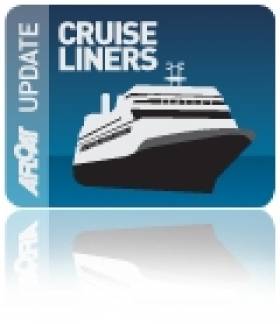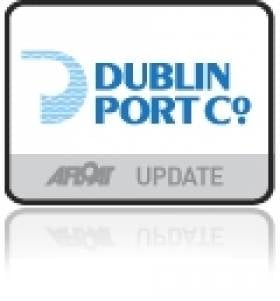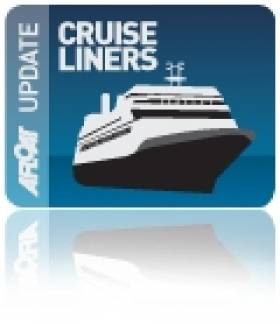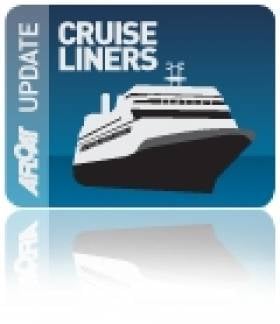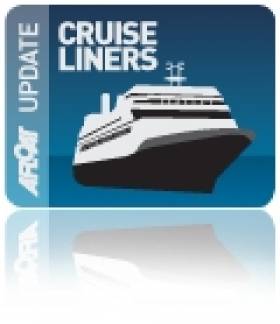Displaying items by tag: Voyages of Discovery
Further Discovery as Cork-bound Cruiseship to Launch Season
#CruiseCORK – The first caller of the Cork cruise season is to be made this evening by Discovery, which as previously reported also started the 2013 season to Dublin Port last week, writes Jehan Ashmore.
She is to due to dock around 22.00hrs this evening alongside the deepwater berth at Cobh Cruise Terminal and where she will make an overnight visit.
A total of 60 cruise ships are scheduled to call in 2013, carrying in excess of 100,000 passengers and crew to be welcomed to the region.
Also recently reported on Afloat.ie was the announcement that the Port of Cork Company is to become 'a sister port' in an alliance with PortMiami, the "Cruise Capital of the World".
Close to 700 passengers can be accommodated on Discovery which is making her debut season operating cruises for Cruise & Maritime Voyages. On this cruise she embarked passengers from her homeport of Avonmouth, near Bristol in north Devon.
The UK based CMV are running cruises by the 20,000 tonnes vessel (and Marco Polo) this season. In tandem the owners of Discovery - Voyages of Discovery are marketing their own cruises using the same vessel under the 'Discovery Sailaway' banner.
Considerably larger cruiseships will call throughout the season to Cork Harbour, for further details and dates click this LINER-LIST.
For example the next caller on 27 April is Royal Caribbean Cruise Lines (RCCL) Vision of the Seas, of 78, 000 tonnes with a capacity for more than 2,400 passengers.
#Cruiseliners -Discovery not only has the distinction of becoming the first cruise caller to Dublin Port in 2013 but also under the brand of Cruise & Maritime Voyages, writes Jehan Ashmore.
The 700 passenger capacity vessel docked today at Ocean Pier having departed her homeport of Avonmouth yesterday for the start of this year's cruise season.
Discovery of 20,000 tonnes and built in 1972 will be followed by fleetmate Marco Polo with a call on Friday to Dublin Port where the port is to welcome another record-breaking season with around 100 calls, with the Gathering being a major visitor draw.
As previously reported on Afloat.ie the giant 2010 built $547m MSC Magnifica of 95,000 tonnes which has more than 1,500 cabins accommodating a maximum 3,223 passengers, is to make her maiden 'Irish' call in late May.
The 294m 'Musica' class vessel is a larger fleetmate of Mediterranean Shipping Company's MSC Lirica, which last year also made a debut docking to Dublin Port and Cobh.
Other large callers to Dublin Port are Caribbean Princess, Celebrity Infinity and Queen Elizabeth which made her inaugural Irish call in 2011.
In addition The World, which also makes a return to the capital following her first ever call to Galway Harbour with an 'anchorage' call in early July.
Last year approximately 90 individual cruise calls were made to the capital which welcomed 100,000 passengers and brought between them €35-50m to the local economy.
With the increase in calls during 2013, the Dublin Port Company is to address future demand through its Masterplan 2012-2040, with a proposed new dedicated cruise terminal completed by 2015.
The facility would be sited along North Wall Quay Extension close to the East Link Bridge.
Dublin Port 2013 Cruise Season to Start with a New Discovery
#CRUISE LINERS – In 2013 Cruise & Maritime Voyages are to charter Discovery (1971/20,216grt) for the UK cruising season to directly replace Ocean Countess, writes Jehan Ashmore.
The charter of the 700 passenger Discovery from Voyages of Discovery will see her operate cruises from Bristol Avonmouth, Liverpool, Hull and Harwich. As part of the charter arrangement her owners will also market the vessel during the season as Discovery Sailaway.
Discovery will undergo an extensive winter dry-docking and refurbishment programme prior to joining the CMV fleet in February 2013.
Her inaugural 'Irish' call will also mark the first cruise caller next year to Dublin Port scheduled on 8 April during a 5-night Springtime Gardens and Charms Cruise. Sharing the season will be CMV's slightly larger 800 passenger Marco Polo (1965/22,080grt).
The near 700-passenger capacity ship operated by UK based Voyages of Discovery is scheduled to call at several Scotish ports before returning to Portsmouth via the North Sea.
Discovery has eight decks with facilities to include two swimming pools, one with a retractable roof, jacuzzis, lounges, bars, a library and gymnasium, lecture theatre, cinema, restaurants, an internet cafe, shop, beauty salon and a medical centre.
She was built in 1971 as the Island Venture, then renamed Island Princess after purchased by Princess Cruises, alongside her sister Pacific Princess which appeared in the popular US TV series sitcom the 'Love Boat' broadcast by ABC between 1977-1986.
In total there will be four cruise-calls during the season to Douglas but the next visit will be not until July when P&O Cruises Adonia calls on the 17th. The ten-year old 710 passenger vessel is due to be named by Dame Shirley Bassey at a ceremony held in Southampton later this month.
Also calling to Douglas will be Oceania Cruises brand new 60,000 tonnes / 1,250 passenger Marina on the 24th July and the final call is to be made by Noble Caledonia's Japanese built Clipper Odyssey in mid-August.
- Killybegs
- Cork
- Discovery
- Marina
- Ringaskiddy
- Cruise Liners
- Princess Cruises
- southampton
- Isle of Man
- P&O Cruises
- Ports and Shipping News
- Manx
- Voyages of Discovery
- Douglas
- Douglas Bay
- Adonia
- Dame Shirley Bassey
- The 'Love Boat'
- ABC
- Pacific Princess
- Island Princess
- Oceania Cruises
- Cruise Liner news
- Clipper Oydessey
- Noble Caledonia
Cobh Cruiseships Come and Go (Footage)
On Friday the Port of Cork welcomes another large cruiseship in the form of the Emerald Princess which carries 3,592 passengers, nearly 500 more than the Celebrity Eclipse. The 113,000 tonnes vessel is nearly 950-feet long, is 118 wide and draws 28 feet under the waterline. With 19 decks the vessel towers above the oceans and will also do so when alongside Cobh's 350m deepwater berth.
One of the numerous amenities onboard is the CyberGolf link and jogging track which are located high up near the stern. Directly situated below is the Skywalkers Nightclub and for movie-goers, films are shown at an oudoor theatre. The top of the range cabins are the 900 balcony staterooms which offer first class hotel style 24-hour room service.



























